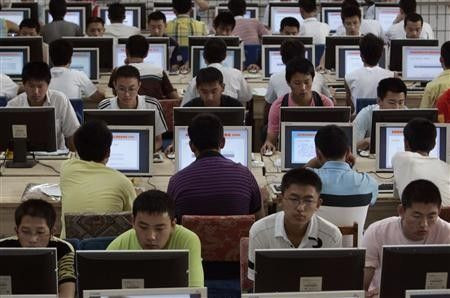Three Uncles, Gravestones And Singing: China's 2012 Seen Through The Web

Internet sensations in a country of 1.3 billion people and more than 500 million Internet users can get pretty big. But in China, they don't happen on Twitter -- they happen on Weibo, the local equivalent. A popular Weibo user, the well-known economist Han Zhiguo, compiled a list of nine of this year's Internet sensations that were big in China's biggest digital community.
1. 'The Voice of China'
"The Voice of China" is a televised singing competition that premiered this year, modeled after the original American version, "The Voice," and became immensely popular. Internet chatter about the show, its contestants and its controversial finale often superseded political or economic news and dominated the Internet in the country. The finale had many netizens questioning the legitimacy of the show, after the winner sang the patriotic song "I Love You China" just a day ahead of Oct. 1, China's National Day, and a few days before the opening of the 18th National Congress of the Communist Party -- suspicious timing, to many skeptical Chinese netizens.
2. The Three Uncles
Weibo users dubbed three of the politicians who made headlines in 2012 for getting sacked for corruption, and other unsavory reasons, Watch Uncle, House Uncle and Second Uncle. The Watch Uncle refers to Fujian province Transportation Chief Li Dejin, who was bribed with expensive accessories, like a new watch. Cai Bin, the House Uncle, was urban management bureau chief for the Panyu district in the city of Guangzhou and was found to own ill-gotten homes. And finally, Beibei district Communist Party chief Lei Zhengfu was disgraced when a sex tape (filmed by angry real estate developers who had trouble with him) showing him with a young woman who was not his wife was released, earning him the name Second Uncle.
Visibly missing from the list of shamed uncles is the disgraced Chongqing city Party Secretary Bo Xilai, who was caught in an international scandal involving his wife and the death of a British expat. It was arguably the biggest scandal of the year in China, and the heightened press coverage of Bo, and the rest of China's government, concerned officials, who temporarily blocked posts on Weibo and searches for "Bo Xilai" and other details regarding the case. After Bo was formally removed from his post, his name was, interestingly, unblocked on Weibo. Chinese media bloggers believe that China wanted to make an example of the official and show the public that such scandals will not be tolerated.
3. The 'Nobodies'
As China's economic growth slows while the cost of living continues to increase, China's middle class is feeling the pinch. Instead, the very wealthy and powerful continue to become richer and gain more control, as China's self-described "nobody," or "diaosi," population continues to suffer. However, the diaosi term is meant to be a humorous, self-deprecating comment. The attitude expressed with the diaosi label is: "I have very little to lose. Why not make a joke of it?" A common lament of users who aren't either tall/rich/handsome or fair/rich/beautiful (see No. 6) is "I'm just a diaosi, poor and plain-looking. Who will marry me?"
4. 'Are You happy?'
China's state-run CCTV news channel went around asking migrant workers the ambitious question: "Are you happy?" The interviews often showed shocked reactions to the question and went viral on the Internet. One gentleman answered, "My last name is Zeng" -- a bit of absurdist comedy stemming from thinking the question was "Is your last name Fu?" "Fu" is one word for happiness in Chinese and can also be a last name.
5. Graves, Taboos And The Government
Officials in Henan province ordered the mass relocation of millions of graves to make way for a new farming project. A report said that the local government is claiming that the relocation was actually voluntary, with the approval of the surviving families. When China's netizens caught wind of the story, many were skeptical that the grave site relocations were voluntary, because it goes against Chinese cultural norms which place a taboo on moving grave sites, which would also be a sign of bad luck.
6. 'Tall-Rich-Handsome, Meet Fair-Rich-Beautiful
Two new terms were coined to describe the ideal Chinese man and woman. "Gao-fu-shuai," meaning "tall-wealthy-handsome," comes as no surprise. The female version, "bai-fu-mei," or "fair-beautiful-rich," shows that the Chinese still find pale skin to be an attractive feature. It's a sign of wealth, because it implies that you don't work outdoors in the sun.
7. And 8. Yuan Fang And 'Yuan Fang, What Do You Think?'
Yuan Fang is a character on a popular Chinese TV series, "Amazing Detective Di Renjie," set at the time of the Tang Dynasty. The title character has a faithful sidekick and bodyguard, Yuan, in a sort of a Holmes-Watson dynamic. When Di encounters a particularly troublesome case, he asks his trusty right-hand man, "Yuan Fang, what do you think?" The catchphrase spread quickly among Weibo users, becoming an Internet meme used across all areas of pop culture, such as in the post of a user who wrote, "Yuan Fang, what do you think about the popularity of Gangnam Style?"
9. The Elusive Escape: How To Break Into Embassies
China watched as political dissidents like the blind human rights lawyer Chen Guangcheng and Chongqing's chief of police involved in the Bo Xilai scandal, Wang Lijun, fled respectively to an American embassy and a consulate to escape Chinese authorities. Web users joked with hilarious results about the most effective strategies to break into embassies for those seeking asylum.
© Copyright IBTimes 2024. All rights reserved.






















